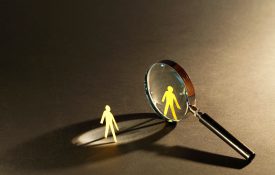-
New Research From Clinical Psychological Science
Read about latest research findings published in Clinical Psychological Science: Jenny Yiend, Charlotte Parnes, Kirsty Shepherd, Mary-Kate Roche, and Myra J. Cooper New research has suggested that negative self-beliefs play a role in eating disorder pathology, but the causal status of this relationship has not yet been established. Female participants underwent cognitive-bias-modification (CBM) training meant to manipulate eating disorder-relevant negative self-beliefs in a positive/neutral or a negative direction. Symptoms and behaviors related to eating disorders, depression, and anxiety were assessed before and after training and at a 1-week follow-up.
-
Days Of Our Lives, One Day At A Time
Anyone who has spent any time around the rooms of Alcoholics Anonymous has heard the phrase “stinkin’ thinkin.’” This folksy expression refers to certain attitudes and thought patterns—blaming, self-pity, negativity in general—that threaten the recovering alcoholic’s emotional sobriety and could, if unchecked, lead to relapse. Not every recovering alcoholic chooses AA, but every recovering alcoholic is at risk of picking up a drink if such destructive thinking goes unchecked. Happily, for those seeking an alternative to 12-step programs, there is a well validated therapeutic approach with the same goals and similar tactics.
-
Why We Feel Others’ Pain — Or Don’t
When the Nigerian terrorist group Boko Haram kidnapped nearly 300 teenage girls from a schoolhouse last month, the world responded with an outpouring of undiluted emotion—shock, outrage, fear, and most of all deep sympathy for the victims and their families. It was impossible not to feel the suffering of these innocent, helpless girls in the hands of their cruel jihadist captors. Well, maybe not impossible. Right-wing commentator Ann Coulter showed not a trace of empathy, as she chose instead to poke fun at a Twitter campaign to raise awareness of the victims’ plight. While the world’s heart went out to the hostages, Coulter responded with a display of callous insensitivity.
-

Reflections on the Failure of Ignorance to Recognize Itself
Distinguished Lecturer David Dunning of Cornell University explores research into the accuracy — and, more commonly, the errors — of human judgment.
-
Read, Kids, Read
The New York Times: Late last year, neuroscientists at Emory University reported enhanced neural activity in people who’d been given a regular course of daily reading, which seemed to jog the brain: to raise its game, if you will. ... Daniel Willingham, a psychology professor at the University of Virginia, framed it as a potentially crucial corrective to the rapid metabolism and sensory overload of digital technology. He told me that it can demonstrate to kids that there’s payoff in “doing something taxing, in delayed gratification.” A new book of his, “Raising Kids Who Read,” will be published later this year.
-
The Anatomy of Everyday Hatred
It’s hard to outdo Medea for raw hatred. Thrown over by her husband Jason for another woman, the mythic sorceress takes revenge by poisoning her rival and, just for good measure, her rival’s father. Then, just to make sure that Jason comprehends the enormity of her wrath, she murders their two sons in cold blood. Now that’s hate—and probably a lot of other emotions as well, including jealousy and humiliation and anger and disgust. Scientists and poets have long been fascinated by intense, negative emotions such as Medea’s, but surprisingly there is no overarching theory of hatred. Who hates whom, and why? What do we mean when we say, I hate? And what do we do about it?

